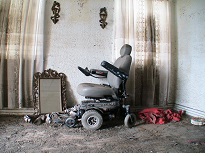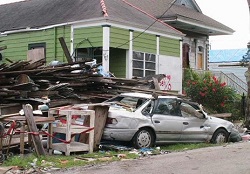Assessing the Impact of Hurricane Katrina on Persons with Disabilities
 This information is available in PDF format upon request.
This information is available in PDF format upon request.
Executive Summary
January 2007
Background
In late 2005, a report was issued by the U.S. House of Representatives Select Bipartisan Committee to Investigate the Preparation for and Response to Hurricane Katrina1. It documents 90 specific failures at all levels of government in planning and response to Hurricane Katrina and the other Gulf Coast storms of 2005. Despite its comprehensiveness, this document pays little attention to the unique challenges associated with ensuring that the needs and priorities of persons with a wide range of physical and cognitive disabilities are met before, during, and after a disaster.
Building on prior work of investigators from the University of Kansas and University of New Mexico, including the CDC/ATPM funded Nobody Left Behind project at the University of Kansas,2 the National Institute on Disability and Rehabilitation Research (NIDRR) sought to address this gap by funding a research project to identify major barriers faced by centers for independent living (CILs) and emergency managers in responding to the needs of people with disabilities with Hurricane Katrina. Through a combination of surveys, focus groups, and interviews in six research sites in the Gulf Coast states, investigators gathered information on the experiences of respondents and developed recommendations to address gaps in policy, planning, and practice.
 Key Findings
Key Findings
There were significant gaps in three broad areas:
• pre-disaster planning by CILs, individuals with disabilities, and local emergency management agencies;
• pre- and post-disaster communication and information sharing within CILs, between CILs and consumers, and between local emergency management agencies; and
• pre- and post-disaster coordination between CILs and other disability agencies, local and regional emergency management organizations, and community supports.
References
A Failure of Initiative: The Final Report of the Select Bipartisan Committee to Investigate the Preparation for and Response to Hurricane Katrina http://katrina.house.gov/
nobodyleftbehind2.org
This report was prepared by Glen White, Michael Fox, and Catherine Rooney at the University of Kansas Research and Training Center on Independent Living and Tony Cahill at the University of New Mexico. This report reflects information obtained from in-depth interviews with CIL and Emergency Preparedness Directors and staff in Alabama, Mississippi, and Louisiana. The National Institute on Disability and Rehabilitation Research funded the research comprised in the Executive Summary and Final Report on: Assessing the Impact of Hurricane Katrina on Persons with Disabilities (H133B000500-04B). The views expressed in this report are not necessarily those of NIDRR, the University of Kansas, or the University of New Mexico.
Document Print Date, January 2007.